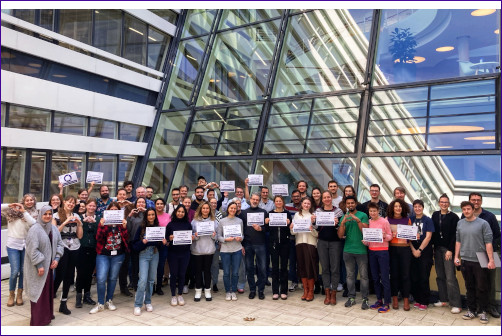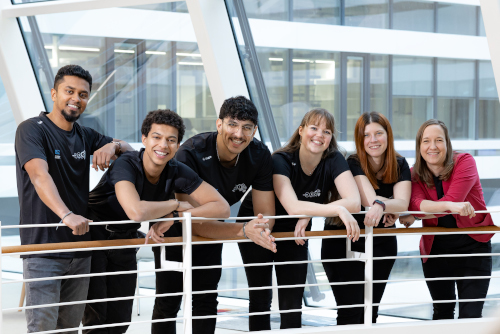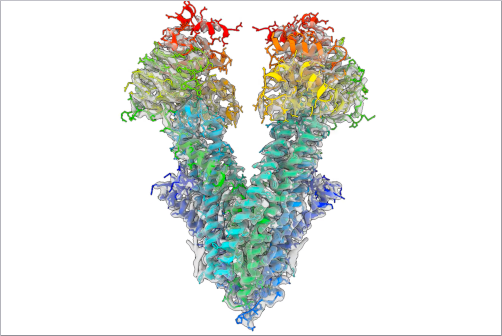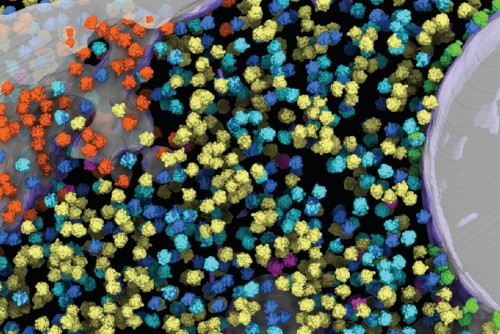An Interview with CSSB’s newest group leader Caroline Barisch
Prof. Dr. Caroline Barisch joined CSSB in July 2023 with an appointment form the Research Center Borstel (RCB). She is also associated with the Universität Hamburg. Her group “Host-Microbe Interactome” focuses on the use of fluorescent and bifunctional lipids to study the effects of inhibiting host-specific lipid pathways during various stages of mycobacterial infections.
The RCB becoming a CSSB partner and the start of the Barisch group will be celebrated with a symposium this Friday, March 8. The welcome symposium is entitled "Decoding Mycobacterial Dynamics - from Structure to Function."
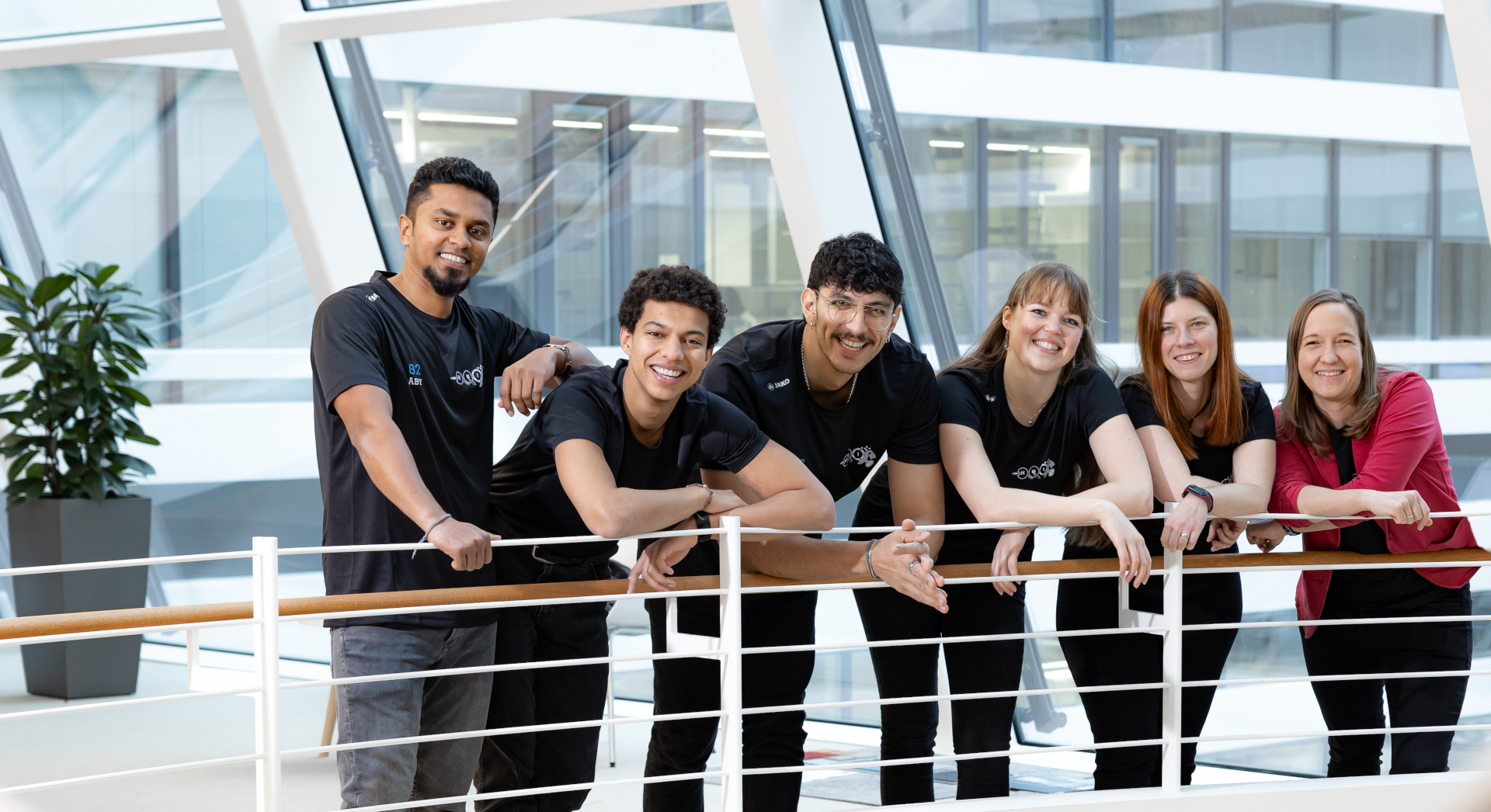
In an interview, Caroline answered questions about her start at CSSB, her plans for 2024 and also gave some great advice about mentorship:
You officially started in July and moved your lab to CSSB in October, what is your impression of CSSB so far?
Since officially starting in July at the Research Center Borstel and relocating my lab from the University of Osnabrück to CSSB in October, my impression of CSSB has been really positive. The environment is warm and welcoming and there is a collaborative spirit among all colleagues! There is also an overall open-door policy, encouraging easy communication and collaboration across different teams.
However, navigating the diverse administrative issues between various partner institutes comes with its own challenges. Still, the benefits of being part of such a vibrant and cutting-edge scientific community far outweigh the complexities.
What was the hardest part about moving your laboratory to Hamburg?
The most challenging aspect of moving my lab to Hamburg was, interestingly, not the professional logistics, but the multitude of personal arrangements that had to be made. I would like to thank here especially my three lab members, Sylvana, Anna, and Aby, who came with me from Osnabrück to CSSB. Without their invaluable assistance, the transfer would not have been as smooth.
On the private side, relocating with my entire family, which includes my better half, the twins and two cats added multiple layers of complexity. For example, we had to significantly downsize and organize our personal belongings and renovate our new home. Despite these hurdles, the process was filled with quite some discoveries and also new opportunities for everyone.
What does your group have planned for 2024? What research goals do you have?
My primary objective is to ensure that my group becomes fully integrated and well-embedded within the CSSB, as well as our partner institute, the RCB. My immediate focus is on establishing strong local networks and laying the groundwork for fruitful collaborations. I am also committed to fulfilling my teaching responsibilities at the Biology Department of the Universität Hamburg. Teaching not only allows me to share my knowledge and experience with the next generation of scientists but also keeps me engaged with the latest developments and challenges in our field.
“If you can't explain it simply, you don't understand it well enough.” ― Albert Einstein
Parallel to these efforts, I am actively working on increasing our group's visibility within the Hamburg scientific community and beyond. This includes touring around Hamburg to meet with other researchers and institutions.
On the research front, we've had productive past six months, with two papers published and another currently under revision. As we settle into our new environment, we aim to build on this momentum in 2024!
Your group is involved in Priority Programme SPP 2225 “Exit strategies of intracellular pathogens.” What is your group’s role in this programme?
Yes, our group is part of the second funding period of the Priority Programme SPP 2225, which is dedicated to understanding the mechanisms through which intracellular pathogens exit host cells, a critical aspect of their life cycle and pathogenicity. Specifically, our research focuses on the process of phagosome exit by mycobacteria. This process has long been overlooked in the scientific community. To explore this in more depth, we employ a combination of molecular biology, biochemistry, and imaging techniques
This Friday is International Women’s Day. What advice would you give to women looking to begin their career in biology?
For International Women's Day, I would like to give the following advice: First, finding strong mentors is crucial. A good mentor can provide not only guidance and knowledge but also support and encouragement. Second, it's important to recognize and leave environments that are not supportive or even toxic. Your professional growth and well-being should always be a priority, and a toxic environment can hinder both. Lastly, I highly recommend seeking out and engaging with networks of women in our field. For instance, I have joined Infect-Net (www.infectnet.org) the Association of German Women working in Infectious Disease Research.
"There is no limit to what we, as women, can accomplish." — @MichelleObama
Who are your role models or mentors?
My role models and mentors in the field have been Thierry Soldati and Dominique Soldati-Favre, two exceptional persons who not only excel as professors in infection research but also balance a family of four children.
Thierry, who was my boss during the postdoc at the University of Geneva, played a particularly supportive role during my pregnancy, which was challenging due to the twins. His support extended beyond the birth, exemplified when he organized a lab retreat four months after the twins were born and made arrangements for the entire Barisch family, including our au-pair, to join!
Dominique has been an exemplary role model, especially significant when I transitioned to a junior group leader. Thanks for this very long zoom meeting that we had when I started in Osnabrück.
Joost Holthuis, during my time as a junior group leader in Osnabrück, stood out for his kindness and invaluable assistance in proposal writing and publishing papers. His mentorship extended to teaching me how to maintain focus and effectively communicate with lab members!
I owe them all a great debt of gratitude. Thanks, with all my heart!
